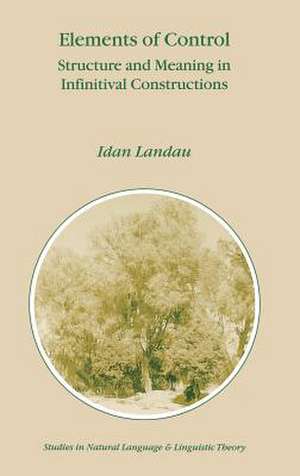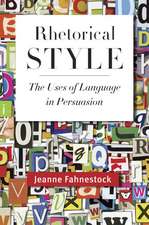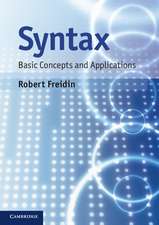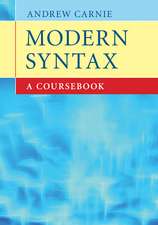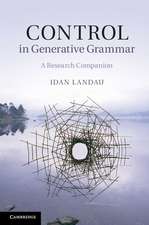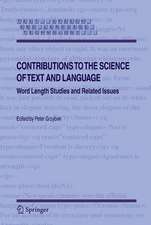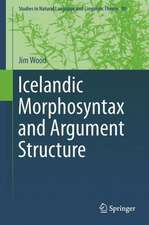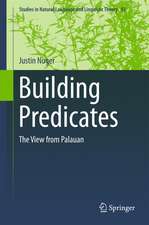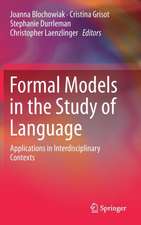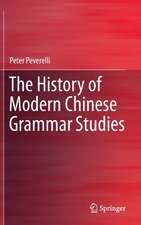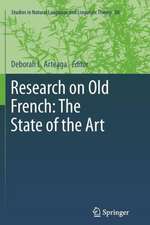Elements of Control: Structure and Meaning in Infinitival Constructions: Studies in Natural Language and Linguistic Theory, cartea 51
Autor Idan Landauen Limba Engleză Hardback – 31 oct 2000
| Toate formatele și edițiile | Preț | Express |
|---|---|---|
| Paperback (1) | 384.31 lei 43-57 zile | |
| SPRINGER NETHERLANDS – 30 noi 2001 | 384.31 lei 43-57 zile | |
| Hardback (1) | 391.79 lei 43-57 zile | |
| Springer – 31 oct 2000 | 391.79 lei 43-57 zile |
Din seria Studies in Natural Language and Linguistic Theory
- 24%
 Preț: 808.03 lei
Preț: 808.03 lei - 18%
 Preț: 788.72 lei
Preț: 788.72 lei - 18%
 Preț: 958.56 lei
Preț: 958.56 lei - 15%
 Preț: 600.26 lei
Preț: 600.26 lei - 18%
 Preț: 947.67 lei
Preț: 947.67 lei - 15%
 Preț: 646.62 lei
Preț: 646.62 lei - 18%
 Preț: 723.56 lei
Preț: 723.56 lei - 15%
 Preț: 604.84 lei
Preț: 604.84 lei - 18%
 Preț: 952.09 lei
Preț: 952.09 lei - 15%
 Preț: 642.51 lei
Preț: 642.51 lei - 18%
 Preț: 947.50 lei
Preț: 947.50 lei - 15%
 Preț: 646.75 lei
Preț: 646.75 lei - 18%
 Preț: 1224.54 lei
Preț: 1224.54 lei - 15%
 Preț: 641.71 lei
Preț: 641.71 lei - 18%
 Preț: 2483.32 lei
Preț: 2483.32 lei - 18%
 Preț: 952.89 lei
Preț: 952.89 lei - 18%
 Preț: 1220.12 lei
Preț: 1220.12 lei - 15%
 Preț: 642.83 lei
Preț: 642.83 lei - 18%
 Preț: 944.19 lei
Preț: 944.19 lei - 15%
 Preț: 648.05 lei
Preț: 648.05 lei - 18%
 Preț: 952.57 lei
Preț: 952.57 lei - 18%
 Preț: 1680.55 lei
Preț: 1680.55 lei - 15%
 Preț: 644.95 lei
Preț: 644.95 lei - 15%
 Preț: 644.63 lei
Preț: 644.63 lei -
 Preț: 384.48 lei
Preț: 384.48 lei - 18%
 Preț: 1662.85 lei
Preț: 1662.85 lei - 18%
 Preț: 955.08 lei
Preț: 955.08 lei - 18%
 Preț: 952.40 lei
Preț: 952.40 lei -
 Preț: 386.81 lei
Preț: 386.81 lei
Preț: 391.79 lei
Nou
Puncte Express: 588
Preț estimativ în valută:
74.97€ • 78.47$ • 62.40£
74.97€ • 78.47$ • 62.40£
Carte tipărită la comandă
Livrare economică 31 martie-14 aprilie
Preluare comenzi: 021 569.72.76
Specificații
ISBN-13: 9780792366201
ISBN-10: 0792366204
Pagini: 212
Dimensiuni: 165 x 247 x 20 mm
Greutate: 0.5 kg
Editura: Springer
Seria Studies in Natural Language and Linguistic Theory
ISBN-10: 0792366204
Pagini: 212
Dimensiuni: 165 x 247 x 20 mm
Greutate: 0.5 kg
Editura: Springer
Seria Studies in Natural Language and Linguistic Theory
Cuprins
1: Introduction.- 1 The Fundamental Questions Of Control.- 2 A Typology Of Control.- 3 EC And PC (Chapter 2).- 4 OC and NOC (Chapter 3).- 5 Control And Predication (Chapter 4).- 6 Implicit Control and Control Shift (Chapter 5).- 7 The Overall Picture and Open Issues.- 2: Exhaustive and Partial Control.- Introduction: Categories of Control.- 1 Some Immediate Corollaries of Partial Control.- 2 Basic Properties of Control.- 3 Distinguishing PC from EC.- 4 PC-Complements as a Natural Class: The Role of Tense.- 5 An Analysis.- 6 Varieties of EC: CP Complements and VP Complements.- 7 Some consequences and Problems.- 8 An Alternative Proposal: Martin (1996).- Summary.- 3: Obligatory and Non-Obligatory Control.- 1 Super-Equi: The Data.- 2 An Analysis.- 3 Configurational Consequences.- 4 Some Problems and Solutions.- 5 Deriving The Distribution of OC and NOC.- Summary.- 4: Control and Predication.- 1 Adjectives and Infinitival Complements: The Puzzle.- 2 Semantic Selection and Clause-Typing.- 3Argument-Modifier Asymmetries.- 4 Two Apparent Problems.- 5 A Crosslinguistic Correlation.- 6 Consequences for the Theory of Control.- Summary.- 5: Implicit Control and Control Shift.- 155.- 2 Control by Implicit Agents.- 3 Control Shift.- 4 The Status of the MDP.- Summary.- References.
Caracteristici
Includes supplementary material: sn.pub/extras
